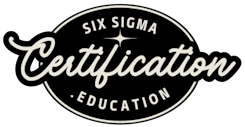What is Six Sigma Yellow Belt Certification?
The Six Sigma Yellow Belt is the entry-level certification within the Six Sigma methodology. It is designed for individuals who are new to process improvement and want to build a strong foundation in the concepts and tools that make Six Sigma effective.
Yellow Belts gain a working knowledge of:
-
Core Six Sigma principles such as DMAIC (Define, Measure, Analyze, Improve, Control)
-
Basic process improvement tools like cause-and-effect diagrams, process mapping, and data collection techniques
-
Team roles and responsibilities, understanding how Yellow Belts support Green Belts, Black Belts, and project leaders
-
Problem-solving approaches that can be applied to everyday workflows
In short, Yellow Belt training ensures you can actively contribute to improvement projects, communicate effectively with project leaders, and spot opportunities for efficiency in your own work.
Why is the Yellow Belt Important?
-
Foundation for Growth: The Yellow Belt establishes a baseline understanding of Six Sigma methodology. Without this knowledge, more advanced concepts at the Green or Black Belt level can feel overwhelming.
-
Immediate Workplace Impact: Even at the entry level, Yellow Belts are able to identify inefficiencies in their teams, recommend improvements, and support larger projects. Employers often see immediate returns on training investments.
-
Increased Employability: Six Sigma is recognized worldwide across industries. Adding Yellow Belt to your resume demonstrates initiative and a commitment to professional development, making you more attractive to employers.
-
Collaboration and Communication: Yellow Belts learn the language of Six Sigma, which allows them to participate meaningfully in cross-functional teams and bridge gaps between departments.
The Case for Industry-Specific Six Sigma Specialist Certifications
While a Yellow Belt provides a broad understanding of Six Sigma, real-world application often requires industry-specific expertise. This is where Six Sigma Specialist certifications come in.
For example:
-
Healthcare: A Six Sigma Specialist in Healthcare focuses on reducing patient wait times, improving safety protocols, and enhancing care delivery.
-
Manufacturing: A Six Sigma Specialist in Manufacturing may work on reducing defects, optimizing production lines, or improving equipment reliability.
-
Pharmaceuticals: Specialists address compliance, quality assurance, and process consistency in highly regulated environments.
-
Supply Chain: Specialists target inventory optimization, logistics efficiency, and cost reduction.
-
Defense: Specialists apply Six Sigma to mission-critical operations, quality control, and compliance with strict government standards.
Each industry has unique challenges, and while the Yellow Belt gives you the tools, a Specialist certification helps you understand how to use them in your specific environment.
Why Pair Yellow Belt with an Industry-Specific Certification?
-
Targeted Skill Development: Instead of general theory, you’ll learn to apply Six Sigma principles to the specific problems and opportunities in your field.
-
Faster Career Advancement: Employers value professionals who not only understand process improvement but also know how to adapt those improvements to their industry.
-
Higher ROI for Organizations: Companies benefit more when Six Sigma-trained employees can solve problems directly relevant to their operations.
-
Professional Differentiation: Many professionals stop at the Yellow or Green Belt. By adding an industry-specific certification, you set yourself apart as someone with specialized, actionable expertise.
The Path Forward
For professionals serious about improving their careers and adding value to their organizations, the Six Sigma Yellow Belt certification is the logical first step. It provides the essential framework, mindset, and tools to understand process improvement.
But to stand out and make a measurable difference, pairing the Yellow Belt with a Six Sigma Specialist certification tailored to your industry creates a powerful combination. You'll not only know the principles of Six Sigma - you'll know how to apply them where it matters most.
Whether you're in healthcare, defense, manufacturing, pharmaceuticals, or supply chain, industry-specific certifications help you bridge the gap between theory and practice, giving you the confidence and credibility to lead real change.

